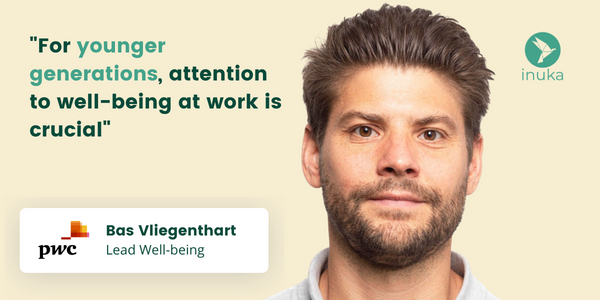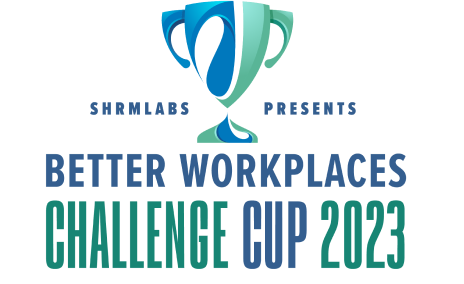Bas Vliegenthart (PWC): “For younger generations, attention to well-being at work is crucial”

Bas Vliegenthart, Wellbeing Lead of PwC on the influence of the younger generation on the wellbeing strategy.
Bas, you are Wellbeing Lead at PwC, can you briefly introduce us PwC and describe your role?
As Wellbeing Lead, I am responsible for the employee well-being and vitality strategy, including the interventions in this area for PwC in the Netherlands. We employ about 5000 people who work from 12 different locations. We strive to make our services and other activities contribute to solving significant problems, and thus help to build trust in society. In this way we aim to add value for both our customers, people and ultimately society.
Back to my role, our vision on employee wellbeing is threefold; curative, preventative and thriving. My scope is both on prevention and thriving; supporting people in this and help them grow. My colleagues in the field of curative employee well-being mainly focus on case management for individual situations. As an organization, we are of course fully integrated.

You are responsible for prevention and growth, what does that look like at PwC?
In a nutshell, every employee in the Netherlands has an individual well-being budget. I am responsible for the policy and the menu offer that employees can use their well-being budget for. In addition, I advise the organization and implement specific (team) interventions at a department level. In fact, in my role I continuously interact with the organization and our suppliers.

How does the decision-making process in the field of employee wellbeing work for you?
Management plays a major role in this. We work with the PwC strategic direction and vision on employees. I regularly meet with the Board member responsible for HR, and with the HR director who leads the people strategy. The HR managers also provide me with input from the various business units. They are, of course, the ones who have the best understanding of the specific challenges per business unit and/or department and can share experiences on interventions that have been implemented. Besides this, we conduct an annual Global People Survey, that allows us to identify how our people are doing. In addition, absenteeism reports, health check data, and insights on how the well-being budget is spent are all important inputs for setting priorities.

What challenges do you face in the field of well-being?
Mental well-being is a challenge for many colleagues. In our high-performance culture and dynamic environment, you must be able to deal with demanding customers, work pressure and stressful situations. PwC has the responsibility to create a safe environment in which employees are allowed to be vulnerable and dare to speak out when they are struggling. In addition, it is important to offer them tools to strengthen their own resilience and to manage their energy.
I recently read an interesting article by Josh Bersin, global HR strategist, in which he claims that employers who focus on employee wellbeing are ultimately the most successful organizations. It’s not just about preventing outages, it’s about a comprehensive wellbeing strategy to help organizations grow. So, in my opinion, mental wellbeing should have top priority.
A holistic and integrated approach is needed to structurally address these challenges. And the latter is very important, that the approach is structural, not just symptom control, but a sustainable prevention approach, with authentic attention for people, especially in stressful times. Currently, we mainly focus on the individual employee, but soon we will also increase focus on team interventions and on team managers and leadership for greater impact.

What do you see as top trends in employee well-being?
The most important trend is how data and technology can be leveraged to improve wellbeing. We are increasingly able to track well-being and tailor our interventions on these insights, ensuring that the interventions are more successful. Secondly, I see as a trend the fact that there is much more attention for mental well-being. The younger generations are forcing employers to be on board. If you ignore these trends as a recruiter, you will be sidelined since young talent is focused on ensuring that they have a great career opportunity, as well as being able to stay healthy and engaged. I see it happening around me. I am 41 now. I started working at the age of 23 and there was never any talk of vitality or well-being at that time. Today, that is totally different, and I see that as a really positive development.
And then I see a third trend; it’s becoming easier to talk about how you’re doing mentally. In the past, if you had a burnout, or were suffering through stress, it was hardly talked about but now the stigma has lifted somewhat. It has become easier for the younger generation to share your experiences. The response is now more likely to be understanding, rather than rejection. I see my primary role as Wellbeing Lead to facilitate this continuous dialogue and to continue to reduce the stigma around wellbeing and mental health.

I hear you say that the younger generation has a big influence on reducing the stigma around mental well-being?
Yes, absolutely. They can do a lot and we’re already making tremendous progress. For example, I was approached by colleagues from Young PwC, which is an international community of younger generations at PWC who have formed an employee resource group.
They have taken the initiative to organize a session for Young PwC-ers with the theme ‘mental well-being at work’. A fantastic initiative that was very well received, especially the open discussions and the involvement of our Executive Board in this event. I wholeheartedly encourage sound initiatives like this!

So, for recruiting top talents within the younger generation, the value proposition of employee wellbeing is crucial. What is your value proposition?
First, we see our employee well-being offering as a unique selling point, alongside the fact that we of course offer interesting and stimulating work and an excellent career track. We have become more explicit about our well-being strategy in our employee branding. We have made the well-being budget an explicit part of the offer, and include our values around supporting our people to find a balance of well-being and work life. This is an absolute prerequisite to raise the interest of the younger generation, which we are fully aware of!

Did you like this interview?
Find more interviews with business leaders of various top companies via the button below. Would you like to receive the next interviews in your inbox? You can register below.
Powered by Inuka Coaching, a #BCorp and value-driven organisation. With our roots in research, we lead on evidence-based, digital and data-driven solutions that achieve measurable impact in employee vitality and resilience.
As part of our mission ‘Everyone resilient’, we strive to bring valuable content to advance the strategic thinking in employee well-being and facilitate a vibrant and growing peer network of leaders, because we all learn faster and achieve more together! Join our peer network of leaders focused on Well-being, register here
- Tags: mental health, Wellbeing
Find this post interesting? Share it with your connections!



